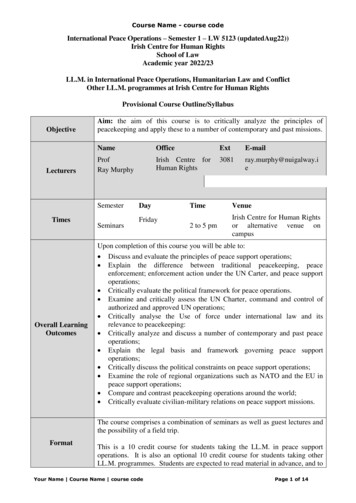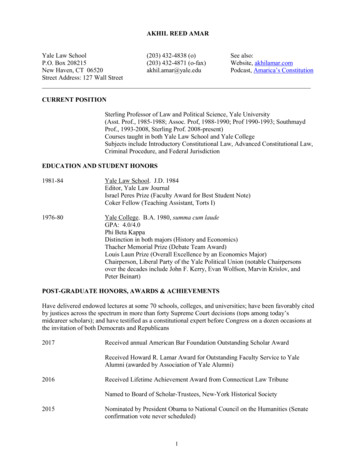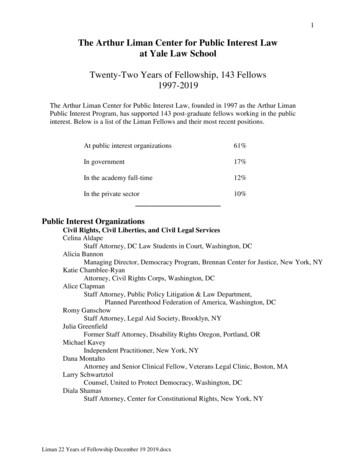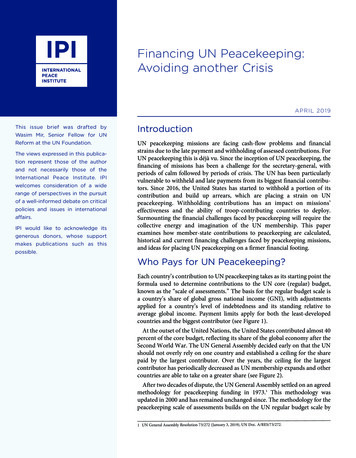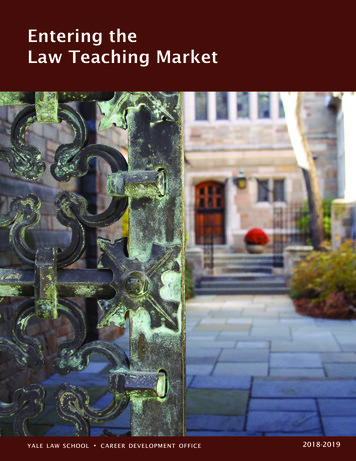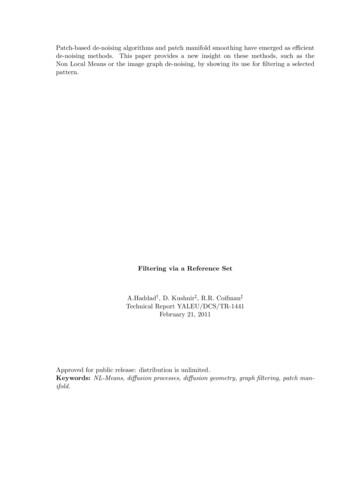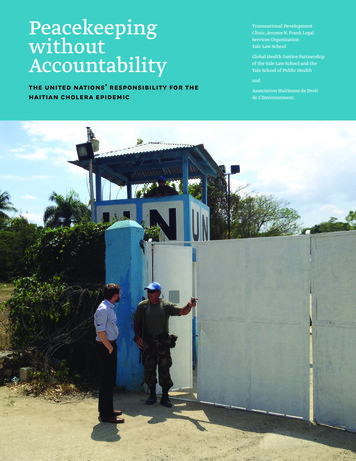
Transcription
PeacekeepingwithoutAccountabilityThe United Nations’ Responsibility for theHaitian Cholera Epidemic1sectionTransnational DevelopmentClinic, Jerome N. Frank LegalServices OrganizationYale Law SchoolGlobal Health Justice Partnershipof the Yale Law School and theYale School of Public HealthandAssociation Haitïenne de Droitde L’Environnment.
The Transnational Development Clinic is a legal clinic, part of the Jerome N.Frank Legal Services Organization at the Yale Law School. The clinic works on arange of litigation and non-litigation projects designed to promote communitycentered international development, with an emphasis on global poverty. Theclinic works with community-based clients and client groups and provides themwith legal advice, counseling, and representation in order to promote specificdevelopment projects. The clinic also focuses on development projects that havea meaningful nexus to the U.S., in terms of client populations, litigation oradvocacy forum, or applicable legal or regulatory framework.The Global Health Justice Partnership (GHJP) is a joint program of the YaleLaw School and the Yale School of Public Health, designed to promote research,projects, and academic exchanges in the areas of law, global health, and humanrights. The GHJP has undertaken projects related to intellectual property andaccess to medicines, reproductive rights and maternal health, sexual orientationand gender identity, and occupational health. The partnership engages studentsand faculty through a clinic course, a lunch series, symposia, policy dialogues,and other events. The partnership works collaboratively with academics,activists, lawyers, and other practitioners across the globe and welcomes manyof them as visitors for short- and long-term visits at Yale.L’Association Haïtienne de Droit de l’Environnement (AHDEN) is a non-profitorganization of Haitian lawyers and jurists with scientific training. Theorganization’s mission is to help underprivileged Haitians living in rural areasfight poverty through the defense and promotion of environmental and humanrights. These rights are in a critical condition in places like Haiti where ruralcommunities have limited access to education and justice.Copyright 2013,Transnational DevelopmentClinic, Jerome N. Frank LegalServices Organization, YaleLaw School, Global HealthJustice Partnership of theYale Law School and the YaleSchool of Public Health,and Association HaitÏennede Droit de L’Environnment.All rights reserved.Printed in the UnitedStates of AmericaReport design byJessica SvendsenCover photograph was takenoutside the MINUSTAH basein Méyè in March of 2013,during the research team’svisit to Haiti.
ContentsIAcknowledgementsII Glossary61011Executive SummarySummary of RecommendationsMethodology13chapter IMINUSTAH and the Cholera Outbreak in Haiti22chapter IIS cientific Investigations Identify MINUSTAHTroops as the Source of the Cholera Epidemic33chapter IIIThe Requirement of a Claims Commission39chapter IV The U.N. Has Failed to Respect Its InternationalHuman Rights Obligations47chapter V The U.N.’s Actions Violated Principles andStandards of Humanitarian Relief54chapter VIRemedies and Recommendations62Endnotes
AcknowledgmentsThis report was written by Rosalyn Chan MD,MPH, Tassity Johnson, Charanya Krishnaswami,Samuel Oliker-Friedland, and Celso PerezCarballo, student members of the TransnationalDevelopment Clinic (a part of the Jerome N. FrankLegal Services Organization) and the Global HealthJustice Partnership of the Yale Law School and theYale School of Public Health, in collaboration withAssociation Haitïenne de Droit de L’Environnment(AHDEN). The project was supervised by ProfessorMuneer Ahmad, Professor Ali Miller, and SeniorSchell Visiting Human Rights Fellow Troy Elder.Professor James Silk and Professor RaymondBrescia also assisted with supervision. Jane Chong,Hyun Gyo (Claire) Chung, and Paige Wilson, alsostudents in the Transnational Development Clinic,provided research and logistical support.The final draft of the report incorporatescomments and feedback from discussions withrepresentatives from: AHDEN, Association desUniversitaires Motivés pour une Haiti de Droits(AUMOHD), Bureau des Avocats Internationaux(BAI), U.S. Centers for Disease Control (CDC),Collectif de Mobilisation Pour Dedommager LesVictimes du Cholera (Kolektif), Direction Nationalede l’Eau Potable et de l’Assainissement (DINEPA),Médecins Sans Frontières (MSF); Partners inHealth (PIH), and the United States Agency forInternational Development (USAID). The authorsalso wish to thank the residents of Méyè, Haiti whowere directly affected by the cholera epidemic forsharing their experiences with the authors duringtheir visit to Méyè.The report has benefited from the close reviewand recommendations of Professor Jean-AndrèVictor of AHDEN and Albert Icksang Ko, MD, MPH,Professor of Epidemiology and Public Health at theYale University School of Medicine. The authors aregrateful for their time and engagement.The authors would like to thank Yale LawSchool and the Robina Foundation for theirgenerosity in funding this project.Finally, the authors thank the followingorganizations and individuals for sharing their timeIacknowledgmentsand wisdom with the team: Joseph Amon, Directorof Health and Human Rights at Human RightsWatch; Dyliet Jean Baptiste, Attorney at BAI; JeanMarie Celidor, Attorney at AHDEN; Paul ChristianNamphy, Coordinator at DINEPA; Karl “Tom”Dannenbaum, Research Scholar in Law and RobinaFoundation Human Rights Fellow at Yale LawSchool; Melissa Etheart, MD, MPH, Cholera MedicalSpecialist, CDC; Evel Fanfan, Attorney and Presidentof AUMOHD; Jacceus Joseph, Attorney and Authorof La MINUSTAH et le cholera; Olivia Gayraud, Head ofMission in Port-au-Prince at MSF; Yves-Pierre Louisof Kolektif; Alison Lutz, Haiti Program Coordinatorat PIH; Duncan Mclean, Desk Manager at MSF;Nicole Phillips, Attorney at Institute for Justiceand Democracy in Haiti ; Leslie Roberts, MPH,Clinical Professor of Population and Family Healthat the Columbia University Mailman School ofPublic Health; Margaret Satterthwaite, Professor ofClinical Law at New York University School of Law;Scott Sheeran, Director of the LLM in InternationalHuman Rights Law and Humanitarian Law at theUniversity of Essex; Deborah Sontag, InvestigativeReporter at the New York Times; Chris Ward,Housing and Urban Development Advisor at USAID;and Ron Waldman, MD, MPH, Professor of GlobalHealth in the Department of Global Health atGeorge Washington University. The authors are alsograteful for the assistance of Maureen Furtak andCarroll Lucht for helping coordinate travel to Haiti.While the authors are grateful to all of theindividuals and organizations listed above,the conclusions drawn in this report representthe independent analysis of the TransnationalDevelopment Clinic, the Global Justice HealthPartnership, and AHDEN, based solely on theirresearch and fieldwork in Haiti.
Glossary of Acronyms and AbbreviationsCDCCenters for Disease ControlCEDAWConvention on the Elimination of All Forms of Discrimination against WomenCERDInternational Convention on the Elimination of All Forms of Racial DiscriminationCRCConvention on the Rights of the ChildCRPDConvention on the Rights of Persons with DisabilitiesCTCCholera Treatment CenterDINEPAHaitian National Directorate for Water Supply and SanitationGeneral ConventionConvention on the Privileges and Immunities of the United NationsIACHRInter-American Commission on Human RightsICESCRInternational Covenant on Economic, Social, and Cultural RightsICJInternational Court of JusticeICRCInternational Committee of the Red CrossIDPInternally Displaced PersonHAPHumanitarian Accountability PartnershipHRCHuman Rights CommissionICCPRInternational Convention on Civil and Political RightsLNSPHaitian National Public Health LaboratoryMINUSTAH U.N. Stabilization Mission in Haiti (Mission des Nations Unies pour la Stabilisationen Haïti)MSFMédecin Sans Frontières (Doctors Without Borders)MSPPHaitian Ministry of Health (Ministère de la Santé Publique et de la Population)NGONon-Governmental OrganizationPAHOPan-American Health OrganizationSOFAStatus of Forces AgreementUDHRUniversal Declaration of Human RightsU.N.United NationsUNCCUnited Nations Compensation Commission in IraqV. choleraeVibrio choleraeVCFSeptember 11th Victims Compensation FundWHOWorld Health OrganizationIIglossary
Executive SummaryThis report addresses the responsibility of the United Nations (U.N.) for the choleraepidemic in Haiti—one of the largest cholera epidemics in modern history. The reportprovides a comprehensive analysis of the evidence that the U.N. brought cholerato Haiti, relevant international legal and humanitarian standards necessary tounderstand U.N. accountability, and steps that the U.N. and other key national andinternational actors must take to rectify this harm. Despite overwhelming evidencelinking the U.N. Mission for the Stabilization in Haiti (MINUSTAH)1 to the outbreak, theU.N. has denied responsibility for causing the epidemic. The organization has refusedto adjudicate legal claims from cholera victims or to otherwise remedy the harmsthey have suffered. By causing the epidemic and then refusing to provide redress tothose affected, the U.N. has breached its commitments to the Government of Haiti, itsobligations under international law, and principles of humanitarian relief. Now, nearlyfour years after the epidemic began, the U.N. is leading efforts to eliminate cholera buthas still not taken responsibility for its own actions. As new infections continue tomount, accountability for the U.N.’s failures in Haiti is as important as ever.The Cholera Epidemic in Haiti and U.N.Accountability: BackgroundIn October 2010, only months after the countrywas devastated by a massive earthquake, Haiti wasafflicted with another human tragedy: the outbreakof a cholera epidemic, now the largest in the world,which has killed over 8,000 people, sickened morethan 600,000, and promises new infections for adecade or more. Tragically, the cholera outbreak—the first in modern Haitian history—was causedby United Nations peacekeeping troops whoinadvertently carried the disease from Nepal tothe Haitian town of Méyè. In October 2010, theU.N. deployed peacekeeping troops from Nepal tojoin MINUSTAH in Haiti. The U.N. stationed thesetroops at an outpost near Méyè, approximately 40kilometers northeast of Haiti’s capital, Port-auPrince. The Méyè base was just a few meters froma tributary of the Artibonite River, the largestriver in Haiti and one the country’s main sourcesof water for drinking, cooking, and bathing.Peacekeepers from Nepal, where cholera is endemic,arrived in Haiti shortly after a major outbreak1executive summaryof the disease occurred in their home country.Sanitation infrastructure at their base in Méyèwas haphazardly constructed, and as a result,sewage from the base contaminated the nearbytributary. Less than a month after the arrival ofthe U.N. troops from Nepal, the Haitian Ministry ofPublic Health reported the first cases of cholera justdownstream from the MINUSTAH camp.Cholera spread as Haitians drank contaminatedwater and ate contaminated food; the country’salready weak and over-burdened sanitary systemonly exacerbated transmission of the diseaseamong Haitians. In less than two weeks after theinitial cases were reported, cholera had alreadyspread throughout central Haiti. During the first30 days of the epidemic, nearly 2,000 people died.By early November 2010, health officials recordedover 7,000 cases of infection. By July 2011, cholerawas infecting one new person per minute, and thetotal number of Haitians infected with cholerasurpassed the combined infected population ofthe rest of the world. The epidemic continued toravage the country throughout 2012, worsenedby Hurricane Sandy’s heavy rains and flooding
in October 2012. In the spring of 2013, with thecoming of the rainy season, Haiti has once moresaw a spike in new infections.Haitian and international non-governmentalorganizations have called on the U.N. to acceptresponsibility for causing the outbreak, but to datethe U.N. has refused to do so. In November 2011,Haitian and U.S. human rights organizations fileda complaint with the U.N. on behalf of over 5,000victims of the epidemic, alleging that the U.N.was responsible for the outbreak and demandingreparations for victims. The U.N. did not respondfor over a year, and in February 2013, invoking theConvention on Privileges and Immunities of theUnited Nations, summarily dismissed the victims’claims. Relying on its organizational immunityfrom suit, the U.N. refused to address the merits ofthe complaint or the factual question of how theepidemic started.Summary of the MethodologyResearch, writing, and editing for this report wascarried out by a team of students and professorsfrom the Yale Law School and the Yale School ofPublic Health. Desk research draws from primaryand secondary sources, including official U.N.documents, international treatises, news accounts,epidemiological studies and investigations, andother scholarly research in international lawand international humanitarian affairs. Over aone year period, student authors also conductedextensive consultations with Haitians affected bythe epidemic, as well as national and internationaljournalists, medical doctors, advocates, governmentofficials, and other legal professionals with firsthandexperience in the epidemic and its aftermath.In March 2013, students and faculty traveled toHaiti to carry out additional investigations. Theyconsulted stakeholders and key informants in boththe Haitian capital of Port-au-Prince and near theMINUSTAH Méyè base where the outbreak started.The Yale student and faculty team presentedstakeholders in and outside of Haiti with a draftsummary and outline of the report for review,discussion and comment. The final draft of thereport incorporates comments and feedback fromall of these consultations.2executive summarySummary of FindingsThis report provides the first comprehensiveanalysis of not only the origins of the choleraoutbreak in Haiti, but also the U.N.’s legal andhumanitarian obligations in light of the outbreakand the steps the U.N. must take to remediate thisongoing humanitarian disaster. This analysis hasconcluded the following:1 The cholera epidemic in Haiti is directly traceableto MINUSTAH peacekeepers and the inadequatewaste infrastructure at their base in Méyè.2 The U.N.’s refusal to establish a claimscommission for the victims of the epidemicviolates its contractual obligation to Haiti underinternational law.3 By introducing cholera into Haiti and denyingany form of remedy to victims of the epidemic,the U.N. has failed to uphold its duties underinternational human rights law.4 The U.N.’s introduction of cholera into Haitiand refusal to accept responsibility for doingso has violated principles of internationalhumanitarian aid.Chapter I examines the legal and political statusof MINUSTAH before and during the epidemic, aswell as the U.N.’s official response to the outbreak.From its establishment in 2004, MINUSTAH hasbeen charged with a broad mandate encompassingpeacekeeping, the re-establishment of the rule oflaw, the protection of human rights, and social andeconomic development. Moreover, following theJanuary 12, 2010 earthquake, MINUSTAH troopsalso assisted in humanitarian recovery effortsin Haiti. After cholera broke out in October 2010,a number of independent studies and clinicalinvestigations pointed to the MINUSTAH basein Méyè as the source of the epidemic. Choleravictims and their advocates have subsequentlycalled on the U.N. for reparations to remedy thesituation and requested meaningful accountabilitymechanisms to review claims, to no avail.Meanwhile, the national and international
response to the epidemic has been underfundedand incomplete.In the years following the outbreak, the U.N.has denied responsibility for the epidemic. TheU.N. has repeatedly relied on a 2011 study by a U.N.Independent Panel of Experts, which concludedthat at the time there was no clear scientificconsensus regarding the cause of the epidemic.However, these experts have since revised theirinitial conclusions. In a recent statement, theyunequivocally stated that new scientific evidencedoes point to MINUSTAH troops as the cause of theoutbreak. As Chapter II of this report establishes,epidemiological studies of the outbreak linkingthe outbreak to the MINUSTAH base in Méyèbelie the U.N.’s claims. Four key findings confirmthat MINUSTAH peacekeeping troops introducedcholera into the country. First, doctors observedno active transmission of symptomatic cholera inHaiti prior to the arrival of the MINUSTAH troopsfrom Nepal. Second, the area initially affectedby the epidemic encompassed the location ofthe MINUSTAH base. Third, the troops at theMINUSTAH base were exposed to cholera in Nepal,and their feces contaminated the water supplynear the base. Finally, the outbreak in Haiti istraceable to a single South Asian cholera strainfrom Nepal. No compelling alternative hypothesisof the epidemic’s origins has been proposed.As Chapter III details, in refusing to provide aforum to address the grievances of victims of thecholera epidemic, despite clear scientific evidencetracing the epidemic to the MINUSTAH camp’sinadequate waste infrastructure, the U.N. violatesits obligations under international law. According tothe U.N. Charter and the Convention on Privilegesand Immunities of the U.N., the U.N. is immunefrom suit in most national and internationaljurisdictions. Because of this legal immunity,the U.N. must provide to third parties certainmechanisms for holding it accountable if and whenit engages in wrongdoing during peacekeepingoperations—an obligation the U.N. SecretaryGeneral has publicly recognized. In a series ofreports submitted to the General Assembly in thelate 1990s, the Secretary-General explained thatthe U.N. has an international responsibility for theactivities of U.N. peacekeepers. This responsibilityincludes liability for damage caused by peacekeepers3executive summaryduring the performance of their duties.The U.N. historically has addressed the scopeof its liability in peacekeeping operations throughStatus of Forces Agreements (SOFAs) signed withhost countries. The Haitian government signedsuch an agreement with MINUSTAH in 2004. Inthis SOFA, the U.N. explicitly promises to create astanding commission to review third party claimsof a private law character—meaning claims relatedto torts or contracts—arising from peacekeepingoperations. Despite its obligations under the SOFA,the U.N. has not established a claims commission inHaiti. In fact, the U.N. has promised similar claimscommissions in over 30 SOFAs since 1990. To date,however, the organization has not established asingle commission, leaving countless victims ofpeacekeeper wrongdoing without any remedy at law.The U.N.’s refusal to establish a claims commission not only violates the terms of its own contractual agreement with Haiti; it also defies the organization’s responsibilities under international humanrights law. As Chapter IV explains, the U.N.’s founding documents require that the U.N. respect international law, including international human rightslaw, and promote global respect for human rights. Inaddition, the SOFA requires that MINUSTAH observeall local laws, which include Haiti’s obligations toits citizens under international human rights law.International human rights law guarantees accessto clean water and the prevention and treatment ofinfectious disease, forbids arbitrary deprivation oflife, and ensures that when a person’s human rightsare not respected, he or she may seek reparation forthat harm. By failing to prevent MINUSTAH fromintroducing cholera into a major Haitian watersystem and subsequently denying any remedy to thevictims of the epidemic it caused, the U.N. failed torespect its victims’ human rights to water, health,life, and an effective remedy. Furthermore, giventhe U.N.’s role as a leader in the development, promotion, and protection of international human rightslaw, it risks losing its moral ground by refusing tocomply with the very law it demands states andother international actors respect.The U.N.’s role in introducing cholera into Haitiis particularly troubling given the humanitarianrole that MINUSTAH has played in Haiti. AsChapter V explains, through its conduct thatled to the cholera epidemic in Haiti, MINUSTAH
violated widely accepted principles that mostinternational humanitarian aid organizationspledge to follow. These principles have also beenaccepted and promoted by U.N. agencies. First, theU.N. violated the “do no harm” principle, whichrequires, among other general and specific duties,that humanitarian organizations observe minimalstandards of water management, sanitation, andhygiene in order to prevent the spread of disease.Second, by denying victims of the epidemicany remedy for the harms it caused, the U.N.violated the principle of accountability to affectedpopulations. Humanitarian relief standardsemphasize that establishing and recognizingmechanisms for receiving and addressingcomplaints of those negatively affected by reliefwork is a critical responsibility of humanitarianaid organizations. In Haiti, the U.N. has refusedto create a claims commission to receive andadjudicate third party claims. By not only rejectingits responsibility for the epidemic but also refusingto provide a forum in which its victims canmake their claims, the U.N. continues to violateminimum standards of accountability.Necessary Steps toward Accountabilityin HaitiHaving examined the U.N.’s derogation of itsobligations to the victims of the cholera epidemicunder international law, international humanrights law, and international humanitarianstandards, Chapter VI outlines the steps the U.N.and other principal actors in Haiti must take tomeaningfully address the cholera epidemic andensure U.N. compliance with its legal and moralduties. The U.N. will need to accept responsibilityfor its failures in Haiti, apologize to the victimsof the epidemic, vindicate the legal rights of thevictims, end the ongoing epidemic, and takesteps to ensure that it will never again cause suchtragically avoidable harm, in Haiti or elsewhere.The first three proposed courses of action forthe U.N. respond to the concerns raised in ChaptersIII-V: By accepting accountability when it errs,apologizing for its wrongs, and providing a remedyto victims of its wrongdoing, the U.N. will satisfyits obligations under the SOFA, internationalhuman rights law, and the humanitarian ethic of4executive summaryaccountability. Furthermore, by taking concreteand meaningful steps to end the ongoing epidemicand guaranteeing that it will reform its practicesto ensure that it does not again cause such a publichealth crisis, the U.N. will address the structuralfailures that led to the outbreak and will begin tofulfill its moral duty to repair what it has damaged.To accomplish this, the U.N. must commit tomaking all necessary investments—particularlyin the areas of emergency care and treatmentfor victims of the disease and clean waterinfrastructure—to ensure that the epidemic doesnot claim more lives. In addition to reducing Haiti’svulnerability to future waterborne epidemics,investments in clean water can also help eliminatecholera from the country.Other entities, starting with the Governmentof Haiti and including NGOs, foreign governments(notably the United States, France, and Canada),and other intergovernmental actors, are also key toremediating the cholera epidemic. These actors musthelp provide direct aid to victims, infrastructuralsupport, and adequate funding for the preventionand treatment of cholera. This includes properlyfunding and supporting the recently completedNational Plan for the Elimination of Cholera in Haiti.The Plan is the Haitian Ministry of Health’s (MSPP)comprehensive program for the elimination ofcholera in Haiti and the Dominican Republic over thenext ten years.Finally, prevention of similar harms in thefuture requires that the U.N. commits to reformingthe waste management practices of its peacekeepersand complying with all provisions of the SOFAs itsigns with countries hosting peacekeepers.While the U.N. has played an important role inthe Haitian post-earthquake recovery effort, it hasalso caused great harm. The introduction of choleraby U.N. peacekeepers in Haiti has killed thousandsof people, sickened hundreds of thousandsmore, and placed yet another strain on Haiti’sfragile health infrastructure. The U.N.’s ongoingunwillingness to hold itself accountable to victimsviolates its obligations under international lawand established principles of humanitarian relief.Moreover, in failing to lead by example, the U.N.undercuts its very mission of promoting the rule oflaw, protecting human rights, and assisting in thefurther development of Haiti.
Recommendations Divided by Relevant Actor1. The United Nations and its Organs,Agencies, Departments, and Programs3. National GovernmentsOffice of the Secretary-General Appoint a claims commissioner per therequirements of paragraph 55 of the SOFA. Ensure, per the requirements of Paragraph51 of the SOFA, that a claims commission isestablished and that its judgments are enforced. Apologize publicly to the Haitian people for thecholera epidemic. Coordinate funding for the MSPP Plan. Fund and supply cholera treatment centers forprimary care of cholera victims. Continue to monitor outbreaks and gatherreliable data on the incidence of cholera. Appoint a claims commissioner under Paragraph55 of the SOFA. Demand that the U.N. appoint a claimscommissioner under paragraph 55 of the SOFA. Effectively implement the MSPP Plan.Security CouncilUnited States Ensure that peacekeepers are accountable fortheir actions in future missions.Department of Peacekeeping Operations Ensure that SOFAs are followed in all missions topromote peacekeeper accountability. Promulgate procedures consistent with SphereStandards to guide peacekeeping operations andconduct.MINUSTAH Apologize publicly to the Haitian people for thecholera epidemic. Ask the Secretary-General to establish a claimscommission. Abide by compensation decisions as ordered by aclaims commission or any other legal forum Vacate the Méyè peacekeeper base and allow thecommunity to turn the land into a treatmentcenter or memorial.2. The World Health Organization andthe Pan-American Health Organization Continue and increase funding of the MSPP plan. Provide technical expertise and ensureimplementation of the MSPP plan.5recommendationsHaiti Fund immediate cholera treatment andprevention via grants to NGOs, the MSPP, andDINEPA. Fund the MSPP plan, both directly and viaassistance to the U.N with fundraising fromother countries. Request that the U.N. appoint a claimscommissioner. Ensure that the CDC continues to support theMSPP Plan.France, Canada, and other NationalGovernments Fund immediate cholera treatment andprevention, via grants to NGOs, the MSPP, andDINEPA. Fund the MSPP plan, both directly and viaassistance to the U.N. with fundraising fromother countries.4. Non-Governmental Organizations Provide supplies and technical expertise forimmediate cholera relief. Help fundraise for and channel donations towardthe MSPP plan. Continue to support the Government of Haiti inits public health efforts.
MethodologyThe findings in this report are based on aninvestigation of the origins of the outbreak andU.N. legal accountability conducted over a oneyear period. Researchers consulted U.N. treatiesand resolutions, international law treatises,and epidemiological studies of the cholerabacterium causing the epidemic, news accounts,and academic research in international law andinternational humanitarian law. Researchersalso consulted victims of the epidemic, activists,attorneys, journalists, aid workers, medicaldoctors, and government agency officials with firsthand knowledge of the epidemic and its aftermath.Researchers conducted most of theirinvestigation from the United States and wereregularly in contact with experts in Haiti. InMarch 2013, researchers traveled to Haiti to consultstakeholders in both the Haitian capital of Port-auPrince and in the town closest to the MINUSTAHbase where the cholera epidemic began.While in Haiti, researchers met withrepresentatives from: Association Haitïenne deDroit de L’Environnment (AHDEN), Association desUniversitaires Motivés pour une Haiti de Droits(AUMOHD), Bureau des Avocats Internationaux(BAI), U.S. Centers for Disease Control (CDC),Collectif de Mobilisation Pour Dedommager LesVictimes du Cholera (Kolektif), Direction Nationalede l’ l’Eau Potable et de l’Assainissement (DINEPA),Médecins Sans Frontières (MSF), Partners inHealth (PIH), and the United States Agency forInternational Development (USAID). Researchersalso consulted residents of Méyè, Haiti who weredirectly affected by the cholera epidemic and whofiled claims against the U.N. seeking relief.Researchers presented the stakeholderswith a summary and outline of the report forcritical discussion. The final draft of the reportincorporates comments and feedback from theconsultations made during the trip to Haiti, as wellas from the close review of experts in internationallaw and public health.6methodology
Chapter IMINUSTAH and theCholera Outbreak in Haiti7section
Chapter IMINUSTAH and the Cholera Outbreak in HaitiSince the early 1990s, the United Nations hasdeployed several peacekeeping and humanitarianmissions to Haiti in response to recurring periodsof political unrest and socio-economic instability.In 2004, following a period of political turmoil,the U.N. Security Council established its currentHaitian mission: the U.N. Stabilization Missionin Haiti, known as MINUSTAH.2 The SecurityCouncil charged M
Justice Partnership of the Yale Law School and the Yale School of Public Health, in collaboration with Association Haitïenne de Droit de L'Environnment (AHDEN). The project was supervised by Professor Muneer Ahmad, Professor Ali Miller, and Senior Schell Visiting Human Rights Fellow Troy Elder. Professor James Silk and Professor Raymond
